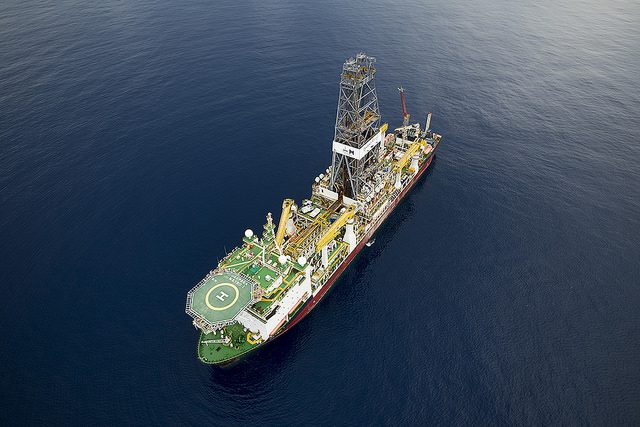Deepsea Metro I, a sixth generation drillship contracted by BG Group to drill offshore Tanzania. Photo: BG Group
By Inyoung Hwang
(Bloomberg) — A fresh drop in in oil prices and political instability in Brazil is making investors miss out on about $5.5 billion in Royal Dutch Shell Plc’s pending takeover of BG Group Plc.
BG closed on Monday at 990.4 pence, about 9.5 percent below Shell’s cash-and-stock offer. The difference in share prices in the deal — the largest in the energy sector in at least a decade — is wider than the average for other global acquisitions bigger than $10 billion, data compiled by Bloomberg show.
The takeover has already won key regulatory approvals from the U.S., European Union and Brazil. Yet a plunge in oil prices and a deteriorating economy in Brazil, a key market for Shell, threaten to erode sentiment among shareholders who may be less inclined to support a merger that was announced when crude was higher. Even in such an environment, Shell will be motivated to close the deal in order to safeguard its dividend in the long run, said Mark Kelly of Olivetree Financial Ltd.
“The risk-reward on this transaction is too cheap,” said Kelly, chief executive officer at the London-based brokerage specializing in mergers. “From a regulatory perspective, there shouldn’t be much risk. And yet, it’s pricing in a one-in-four chance it breaks. What you need to break this transaction is a massive rebellion from shareholders.”
Kelly is referring to his model, which shows about a 75 percent chance the deal will be completed, higher than the 55 percent probability Bloomberg data indicate. Shell’s Chief Executive Officer Ben van Beurden said he is confident investors will support the transaction, and BG shares rose for four straight days after a Sept. 9 report mentioning that he said only “something cataclysmic” could derail the $70 billion acquisition.
A Shell representative said the company expects the deal to complete early in 2016. BG didn’t immediately have a comment.
Australia’s competition agency stoked concern last week when it delayed a decision on the takeover until November. Since then, both BG and Shell shares have resumed declines, as oil dropped further. Shell’s plan has also been roiled by political turmoil and a Petroleo Brasileiro SA corruption scandal in Brazil. The nation’s president is in danger of impeachment, adding uncertainty over BG’s partnership with Petrobras to develop giant offshore oil reserves that are under a layer of salt.
Risk arbitrage hedge funds have less sway in influencing the share price of the target company in a mega-merger like Shell-BG. Such funds are also leery of allotting a significant amount of capital into a single deal after being burned last year by the collapse of AbbVie Inc.’s purchase of Shire Plc.
As stocks and commodities tumbled in August, merger- arbitrage spreads in deals worldwide widened. Some fund managers took advantage of the volatility and allocated more money to deals expected to close sooner — in other words, transactions with smaller near-term risk, according to Amir Madden of GAM Holding AG, which oversees about $127 billion. In turn, spreads in these transactions compressed more quickly.
“Deals in energy that may have regulatory hurdles or that aren’t expected to close in the short-term didn’t see spreads narrow as quickly,” said Madden, a London-based portfolio manager of an event-driven fund at GAM.
Last week’s deferral by the Australian Competition and Consumer Commission risks pushing out approval from China’s antitrust regulators until after the Lunar New Year in February, said Aneek Haq, an analyst at Exane BNP Paribas. He still says the deal is a necessary step for Shell, with BG’s deep-water fields in Brazil representing the key prize.
“This is about opportunity cost for Shell,” Haq said from London. “That stands with oil at $20 a barrel and stands with oil at $100 a barrel.”
Crude has tumbled 12 percent this year, extending declines after the Federal Reserve left borrowing costs unchanged, fueling deeper worries about the health of the global economy.
“If the market becomes more volatile, could there be more de-risking? Absolutely,” said GAM’s Madden. “Would de-risking lead to spreads widening? Probably. Now would it be temporary? Most likely.”
–With assistance from Elizabeth Fournier and Rakteem Katakey in London.
©2015 Bloomberg News

 Join The Club
Join The Club











